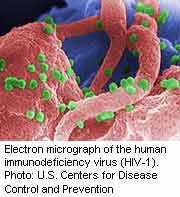
THURSDAY, Feb. 16 (HealthDay News) — In studying how HIV is transmitted, researchers have discovered that some African sex workers are naturally resistant to the virus, a finding that could influence prevention efforts.
These women are protected by an unusually weak inflammatory response in their vaginas, the scientists noted.
“In this part of the world, women represent over 60 percent of HIV cases, and this proportion continues to increase,” Dr. Michel Roger, of the University of Montreal Hospital Centre and its microbiology and immunology department, in a news release. “Studying women who are naturally resistant to the virus enables researchers to identify interesting information in terms of developing vaccinations or microbid gels that could prevent transmission of HIV.”
The researchers followed women from Benin and Zimbabwe over the course of 15 years. They found that when some of these women are exposed to HIV, the immune-system cells in their vaginas produced fewer inflammatory molecules than the cells in women infected with the virus.
Although these molecules are usually helpful by activating lymphocyte T-cells that destroy viruses, HIV actually uses these T-cells to invade people’s bodies, the researchers said.
“Fewer T-cells means fewer target cells available for the virus to use,” Roger explained.
The researchers also found the women’s immune response in their vaginas — where the virus entered their body — was different from their body’s response once the virus was in their bloodstream. The study concluded that a better way to stop the spread of HIV would be to block the virus from entering the body, rather than fight it once it had already invaded.
“AIDS vaccination research has entirely focused on the bloodstream and this approach has been a failure,” Roger said. “Our research shows that the immune response is different at the site of the infection, and that we should turn to the entry points in order to find a means for blocking the virus.”
The researchers said that the body’s mucus membranes would be protected through a through a nasal-spray vaccine.
They added that more research is needed to fully understand the immune response in the vagina and determine if women’s DNA plays a role in natural HIV resistance.
The results were recently published in the journal PLoS ONE.
More information
The U.S. Centers for Disease Control and Prevention provides more information on HIV and AIDS.

